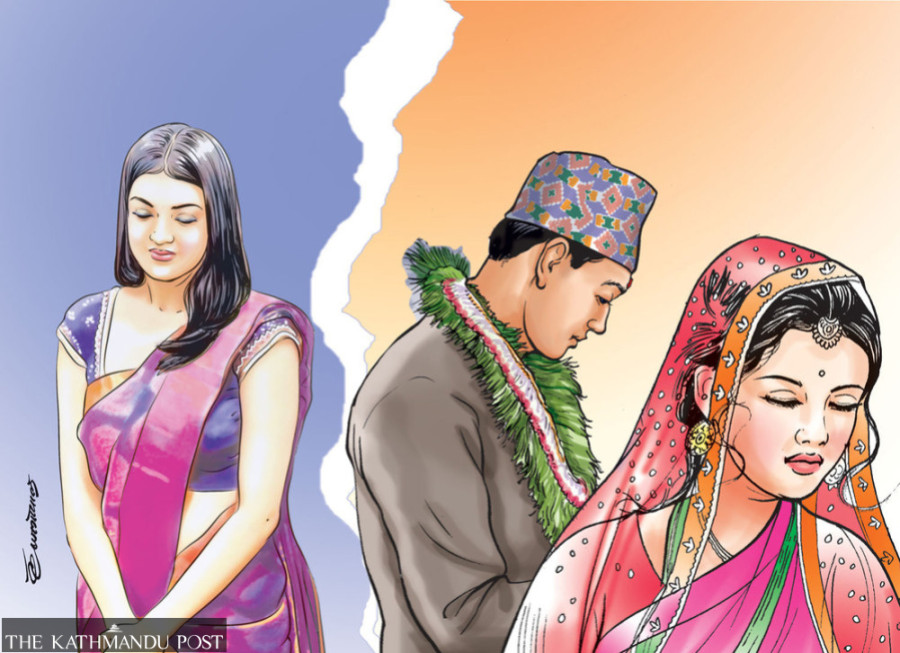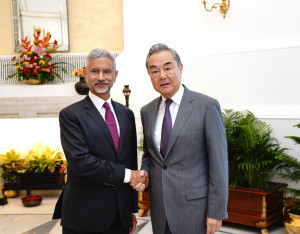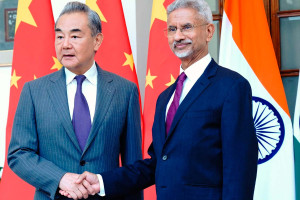National
What changes are being proposed to marriage laws in Nepal
A new bill to amend the Criminal Code would prevent automatic annulment of certain polygamous marriages if a child is born or the woman is pregnant.
Jaya Singh Mahara
The government is currently advancing a bill to amend legal provisions related to polygamy. The Cabinet’s bill committee is reviewing the bill to amend the Criminal Code, 2017. Through this bill, the government is preparing to change the existing law on polygamy.
What is the new proposed arrangement on polygamy?
The government is preparing to amend Section 175 of the Criminal Code. The current law states that a married man or a married woman shall not commit polygamy, but the proposed amendment changes the wording to apply to “any married person.”
If this amendment is passed by Parliament, Section 175(1) will state, “Any married person shall not enter into another marriage while the previous marital relationship exists.” In addition, the amendment proposal, if endorsed, removes the existing provision under Section 175(2), which states that no woman shall conclude marriage with a man knowingly that he is already married.
The government has also proposed to add subsections (5A) and (5B) after subsection 5 of Section 175. Currently, sub-section 5 states, “The marriage referred to in sub-section (1) shall, ipso facto, be void.” This means the subsequent marriage is automatically cancelled. However, under the new law, polygamous marriages will no longer be automatically void. In specific cases, such marriages will not be annulled, but the person who commits polygamy will face imprisonment and fines.
For this, the government is amending the Criminal Code with new provisions. The newly proposed sub-section (5A) says, “Notwithstanding anything in sub-section (5), if a child has been born from the marital relationship or the woman is pregnant, the marriage shall not be annulled solely because of punishment for polygamy.”
If a woman is pregnant or a child is born from an extramarital relationship, the person will face imprisonment of one to five years and a fine of Rs10,000 to Rs50,000, but the marriage registration will not be annulled. This is the government’s proposal. Under this law, once the sentence of imprisonment and fine is served, the couple can continue their marital life.
If a child is born or the woman is pregnant, polygamy will be punishable, but the marriage will not be annulled. The government claims this law protects children’s citizenship and property rights. However, rights activists say the mandatory search for the father gives more power to men.
The proposed change would grant legal recognition to children born from extramarital relationships. Critics argue this does not aim to curb such relationships but could instead encourage them by effectively legalising them. They say that if the government’s concern was the status of children, it could have addressed the issue by recognising such children’s rights directly or by requiring men engaged in extramarital affairs to divorce their spouses. In their view, the current proposal reinforces patriarchal norms.
Another provision in sub-section (5B) of Section 175 proposes compensation for cases where a marriage happens by deception or fraud. It states: “Notwithstanding anything in sub-section 5, if a married man or woman deceives or misleads the other party into believing they are unmarried or that the marriage does not exist, the court shall order reasonable compensation for the aggrieved party.”
This provision addresses compensation for victims deceived into second marriages. However, it does not specify whether such marriages remain valid or are automatically annulled. This clause only discusses compensation.
After the government’s proposal became public, it faced widespread opposition. Following this, the Cabinet’s bill committee formed a sub-committee for further study.
What is the government doing after the opposition?
The government faced criticism over a proposed law seen as recognising polygamy, with questions echoing from social media to the streets and Parliament over whether it is attempting to legalise the practice.
Opposition and some ruling party lawmakers demanded that government ministers answer these questions in Parliament immediately. Law, Justice, and Parliamentary Affairs Minister Ajay Kumar Chaurasiya responded on August 6 in the House of Representatives, saying that rumours and interpretations by some media and social networks created confusion and anger among the public.
Minister Chaurasiya said the bill is based on a report prepared by a committee led by then Supreme Court Justice Ananda Mohan Bhattarai and approved by the full bench of the top court. The process to update criminal and civil laws was already underway under the previous government. After being reviewed by the Supreme Court and the previous government, the process is now moving forward.
“The bill committee discussed the bill. It was found that amendments are needed on topics such as polygamy, marriage age, anticipatory bail, and presidential pardons. Therefore, a subcommittee has been formed to study and suggest recommendations,” he said.
The sub-committee, chaired by Phanindra Gautam, secretary at the Prime Minister’s Office, includes representatives from the ministries of Law and Women, the Nepal Law Commission, and the Attorney General’s Office. Minister Chaurasiya also assured that no bill allowing polygamy or any negative social impact will be tabled in Parliament.
What is the current legal provision on polygamy?
The Civil Code Part 3 covers family law, including marriage. Section 67 states that a marriage shall be deemed to have been concluded if a man and a woman accept each other as husband and wife through any occasion, ceremony, formal or other act.
Section 69 guarantees freedom to marry, maintain a family, and live a family life under the law. It requires all marriages to be publicly registered. The legal age for marriage in Nepal is 20 years.
Section 74(2) states that if a woman becomes pregnant and gives birth as a result of rape, or if a woman becomes pregnant and gives birth from sexual contact with a male relative in cases of incest, such a relationship will not be considered a marriage. It also clarifies that the constitutional and legal rights of the child born from such a relationship will not be affected.
What are the punishments and fines for polygamy?
Under Chapter 11 of the Criminal Code, Section 175 prohibits polygamy.
It states that no married man shall, during the continuation of the marital relationship, conclude another marriage, and no woman shall conclude marriage with a man knowingly that he is already married.
Likewise, a person who commits, or causes to be committed the offence shall be liable to a sentence of imprisonment for one year to five years and a fine of Rs10,000 to Rs50,000, and such marriage shall, ipso facto, be void.
Who can file a case?
The first wife can file a complaint against her husband and the second wife, with the government acting as the plaintiff. Proceedings begin only after the victim lodges a complaint; without one, the offence is deemed accepted. As polygamy is socially unacceptable, neighbours or community members can also report it, and the police will act on such information.
Section 176 establishes a statute of limitations, stating that a complaint under this chapter must be filed within three months from the date the offence is discovered.
What happens to children born to polygamous marriages?
The constitution and law guarantee children’s rights. Article 39 guarantees every child’s right to identity, name, and birth registration. Every child has the right to education, health, care, recreation, and full personality development.
The Act Relating to Children, 2018, mandates that parents name and register their child’s birth according to law. The Act also grants children the right to maintain contact with their parents unless restricted by the child court. Parents separated by divorce or other reasons must share child support costs based on their capacity.
Children born to polygamous marriages often face problems when obtaining citizenship, especially if applying under the mother’s name alone. This triggers a mandatory investigation to find the father, causing administrative delays. The second marriage is automatically annulled, complicating matters for the child’s legal rights.
To address this, a bill allowing citizenship solely through the mother’s name is under consideration in the federal Parliament. The bill proposes that the mother must submit a self-declaration if the father’s name is omitted. The district administration will then issue citizenship based on this declaration, simplifying the process.




 20.03°C Kathmandu
20.03°C Kathmandu

















